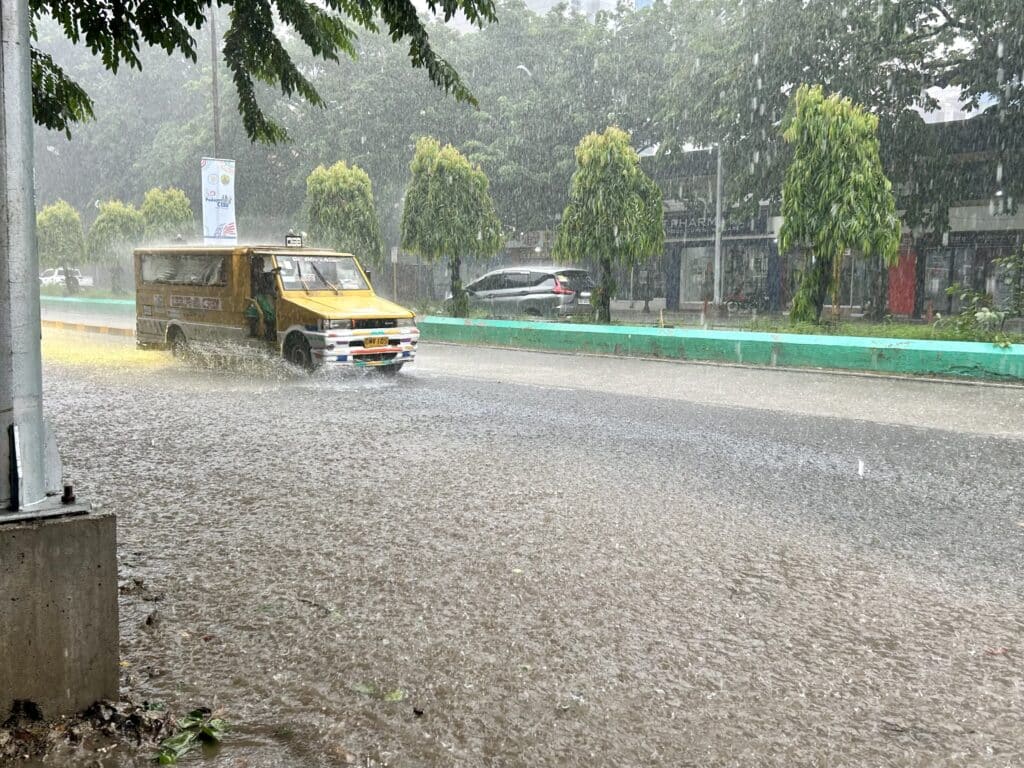
A photo was taken along Osmeña Boulevard on the rainy afternoon of August 1, when a strong downpour hit Cebu City. | CDN Photo/ Pia Piquero
CEBU CITY, Philippines – Cebu City is planning to pursue another multi-billion peso flood control initiative for 2025.
This, despite being flagged by the Commission on Audit (COA) over budget mismanagement in previous flood mitigation projects.
The Department of Public Works and Highways (DPWH) allocated at least P2 billion for essential infrastructure aimed at addressing the city’s chronic flooding problems.
Councilor Jerry Guardo, chairman of the Committee on Infrastructure, said that the P2 billion allocation came from the Program of Works and Estimates (POWE) dedicated to flood control projects next year.
He said that the city government requested additional funding from the Department of the Interior and Local Government (DILG) under the “Beyond Border” agreement, a collaborative initiative between Cebu City and Mandaue City aimed at addressing transboundary flooding concerns.
“We need national government assistance,” Guardo said in a news media forum on August 13.
READ MORE:
Cebu City forms team to implement gabion dams for flood control
Is Cebu City ready for massive flooding?
The Beyond Border initiative seeks to rehabilitate critical waterways, including the Butuanon and Mahiga Rivers, which serve as natural boundaries between Cebu City and Mandaue. Both cities have committed to supporting these rehabilitation efforts to curb flooding.
The DPWH’s P2 billion budget will fund key projects, including the construction of transitory homes for informal settlers displaced by the clearing of waterways and the installation of gabion dams.
These dams, along with mini-dams planned for upland areas, aim to reduce runoff water volume and alleviate flooding in lowland areas.
Guardo noted that four to five sites have been identified for the construction of mini-dams, which are expected to have a similar capacity to the Buhisan Dam.
Technical working group to address flooding
On August 7, the Cebu City Council ratified a new ordinance creating a technical working group (TWG) dedicated to the research, design, and implementation of gabion dams.
The new ordinance aims to establish a framework for enhancing water resources and mitigating environmental issues such as flooding.
“Gabion dams help control erosion, improve water quality, and boost biodiversity…They are crucial not only for flood control but also for ensuring water security, especially during droughts,” said City Councilor Nestor Archival, one of the sponsors of the said ordinance.
The new ordinance was sponsored by Councilors Nestor Archival Sr., Joy Young, Jocelyn Pesquera, and Joel Garganera, and is titled “An Ordinance Mandating the Creation of a Technical Working Group for the Research, Design, Construction, and Establishment of Gabion Dams or Other Water Impounding or Recharging Facilities in Strategic Sites within the City of Cebu, and Providing for a Budgetary Allocation.”
Moreover, Guardo reported that 92 percent of informal settlers along Estero de Parian had voluntarily agreed to demolish their structures in exchange for relocation.
Business establishments that would refuse to comply with clearing efforts would face non-renewal of their business permits unless they would vacate the no-build zones, Guardo warned.
READ MORE: Flooding in some areas in northern Cebu due to heavy rain
COA flags previous flood control projects
However, the city’s flood control efforts have been shadowed by issues of mismanagement.
In a 2023 report, the Commission on Audit (COA) flagged the Cebu City government for failing to recover an excessive advance payment made in 2021 for a delayed drainage project in the South District.
According to COA, a Manila-based contractor received a 15 percent mobilization fund of P199.323 million in 2021 for the design phase of a P1.3 billion drainage project covering several Cebu City streets.
Despite the initial contract, which began in April 2021 and was supposed to end in November 2022, the project remains in the design phase following three suspension notices and a new contract set to expire in November 2023.
COA highlighted that under Republic Act 9184, also known as the Government Procurement Reform Act, the contract could not be extended beyond its expiration. This translates into the city’s ability to manage future large-scale flood control projects effectively.
As Cebu City eyes another billion-peso investment for 2025, will these projects finally deliver the much-needed flood relief, or will they fall victim to the same pitfalls of mismanagement and delay?

